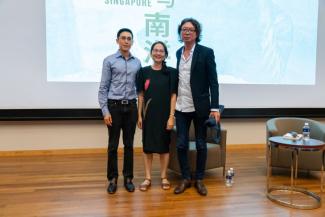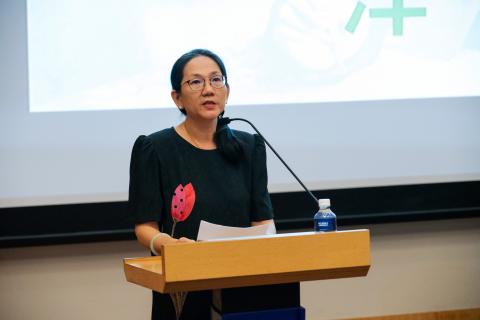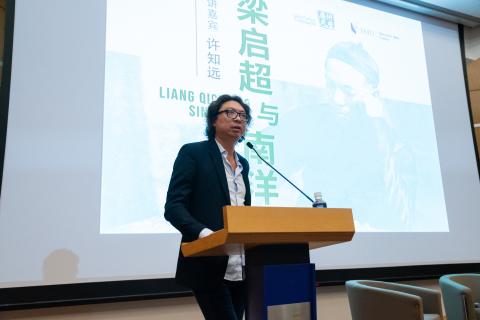
Organised by Singapore Management University’s (SMU) Office of Core Curriculum and Wee Kim Wee Centre, Lien Fung’s Colloquium this year featured a lecture by writer Xu Zhiyuan, on Liang Qichao’s vision of China’s reformation in the 19th century and its connection to the Singaporean community. About 80 participants, comprising faculty and staff, alumni, industry partners, guests from various sectors and the public, attended the event held at the Mochtar Riady Auditorium on 9 November 2019 (Saturday).
The Lien Fung’s Colloquium at SMU was established by Mrs Ho Lien Fung in April 2003. The Colloquium aims to enhance public understanding and appreciation of culture and society through lectures, talks and other events, with particular focus on everyday life, while not being dominated by academic or philosophical titles.
It was Mrs Ho’s hope that the Colloquium would inspire students as well as satisfy the community’s quest for broader knowledge. The Colloquium is also aligned with SMU’s aim of making meaningful impact by stimulating ideas and interactive discourse on pertinent issues that affect the well-being of people, organisations and societies.
Tan Sor Hoon, Professor of Philosophy and Lee Kong Chian Fellow at SMU, welcomed guests to the lecture. Addressing the audience in Mandarin, she said, “Mrs Ho Lien Fung was an award-winning bilingual writer, whose books formed part of my mandatory reading as a schoolgirl in secondary school. I enjoyed her written prose and admired her unerring pursuit of knowledge and efforts to foster understanding across cultures. Due to her generosity and passion for promoting education and knowledge, we stand to gain from platforms such as today’s Lien Fung Colloquium. We are honoured to have Mr Xu Zhiyuan as our speaker for today at SMU.”

Prof Tan introduced Mr Xu Zhiyuan as a prolific writer and one of China’s best-known intellectuals. Born in Jiangsu, China, in 1976, Xu graduated from Peking University’s Computer Science department with a specialisation in Microelectronics. He was a visiting scholar at Cambridge University from 2009 to 2010, and at the University of Berkeley from 2013 to 2014. Xu pays close attention to domestic social affairs in contemporary China, and monitors the country’s links to broader global issues and trends.
Xu’s works combines keen insight and elegant writing, and are timely yet historically relevant. Widely regarded as one of the most important Chinese-language writers in modern times, Xu’s 17 publications have been translated into various languages including English, French, and Korean. He recently completed an extensive biography of Liang Qichao, a key figure behind the May Fourth Movement in China.
Although Liang Qichao had never set foot in Singapore, he had numerous links with the Southeast Asian city-state, including the fact this his mentor, Huang Zunxian, was once the Chinese envoy to Singapore. In 1898, Liang and Kang Youwei led the Hundred Days of Reform. This situation in Beijing was monitored closely by Singapore’s literary pioneer and community leader, Khoo Seok Wan.
Subsequently, when Kang and Liang went into exile and established the Chinese Empire Reform Association, Khoo founded the Thien Nan Shin Pao newspaper to establish solidarity and provide financial support to them. Such initiatives indicated the strong connection that the overseas Chinese in Singapore had to the changes that were then happening in China.
Within this historical context, Xu Zhiyuan explored Liang Qichao’s vision of China’s reformation, and its ties to the Singaporean community during his lecture at SMU. He provided insights into Liang’s experiences as an instrumental figure behind China’s May Fourth Movement in China. This movement, along with the cultural awaking it represented, resonated strongly with the Chinese community in Singapore.

The event concluded with a Q&A moderated by Prof Tan, whose publications include a monograph on Confucian Democracy: a Deweyan Reconstruction, and an edited volume on Challenging Citizenship: Group Membership and Cultural Identity in a Global Age. She sits on the board of the World Consortium for Research in Confucian Cultures, as well as the editorial boards of Dao, Contemporary Chinese Thought, Contemporary Pragmatism, Comparative and Continental Philosophy, and Comparative Philosophy.
[Photo: (from left) Prof Elvin Lim, SMU Dean of Core Curriculum and Director of Wee Kim Wee Centre with Tan Sor Hoon, Professor of Philosophy and Lee Kong Chian Fellow, and writer Xu Zhiyuan at Lien Fung Colloquium held at SMU.]